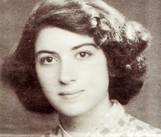Receive Our Newsletter
For news of readings, events and new titles.

"Hayat Sharara was born in the old neighbourhood of Najaf city, Iraq, in 1935. She demonstrated significant literary talent from an early age. She developed a strong passion for modern poetry, thanks to my father, who used to recite poetry almost daily, and we stored many of these in our memory. Besides, he was a great help to us in improving our Arabic language proficiency as he spoke standard Arabic even in our daily conversations. Hayat showed high talent in memorizing complete poetry collections and proved herself a staunch competitor of my father in the poetry competitions held within the family.
When we moved to Baghdad in the mid-1940s, our house became a meeting place for many poets, littérateurs, and thinkers of divergent political affiliations. During those weekly meetings, Hayat sat in a corner of the room, carrying in her tiny hands a notebook where she wrote down the new poems recited, little knowing that those were the seeds of a new current of Arabic poetry. . . . Badr Shakir al-Sayyab and Lamia Abbas Amara . . . and Nazik al-Malaika . . . were constantly present at those gatherings . . .
Having experienced the injustice meted out to her family during part of her childhood, Hayat became a political activist in the prime of her youth, with an overwhelming zeal to fight oppression and injustice. . . . Although she completed high school successfully and obtained her baccalaureate, Hayat did not gain admission to Baghdad University because she could not obtain a certificate of good conduct (CGD), which was used as a weapon against disloyal students, particularly leftists and communists, to deny them access to college education and employment. . . . As part of the Party’s policy to turn the teaching sector into an exclusive territory for the Ba’athists, Hayat was asked to join the [Ba’ath] Party if she valued her university job. When she refused, she was transferred to the Ministry of Industry to work as an interpreter on a Russian project . . .
In 1994, [Hayat Sharara's] daughter Maha graduated from university and started to look for a job. Although she successfully passed an interview for a job at the Ministry of Oil, her appointment was blocked by the Minister, citing two reasons: she was not part of the Ba’ath Party, and her mother was Hayat Sharara. . . .
On August 1, 1997 . . . the tragic news that both Hayat and her daughter Maha had committed suicide. . . .
She left behind a different city that shared little with the one she had known and loved. A city reeking of foul sewers and dead bodies on the streets, where mosquitoes, flies, stray dogs and cats, and barefooted children feasted on heaps of garbage everywhere across the city. A wounded city, inhabited by dead bodies in motion. Yet, the sad looks of the hungry and terrified people concealed a silent revolution building up. . . .
From the introduction by Hayat's sister Balkis Sharara
to Idha al-Ayyam Aghsaqat (When the Days Grow Dark)
To get a copy of Banipal 63 and read the full feature,
go to current issue page and choose your postage region.
Contributor's Issues